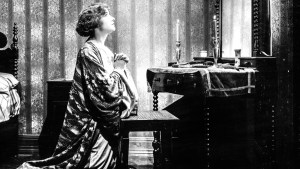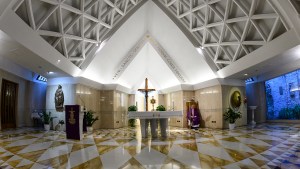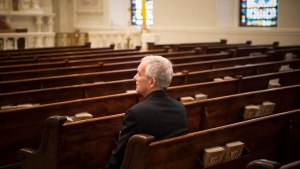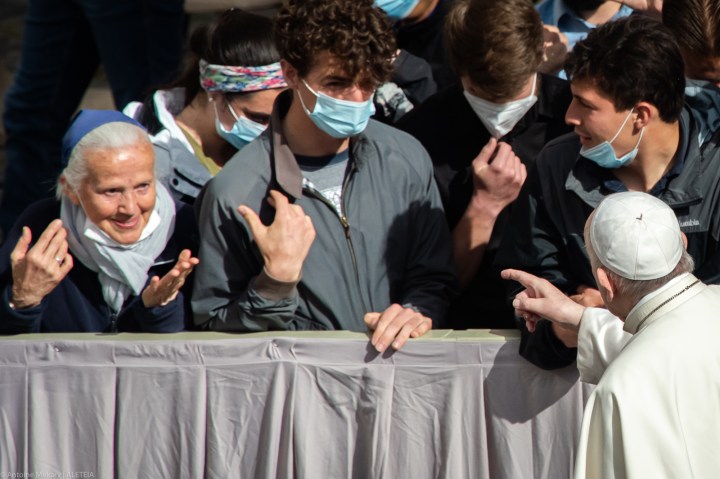“Christian prayer, like all Christian life, is not a ‘walk in the park,'” acknowledges Pope Francis. “None of the great people of prayer we meet in the Bible and in the history of the Church found prayer ‘comfortable.'”
“Prayer certainly gives great peace,” the pope said, as he continued his teaching series on prayer, but that peace comes with “inner struggle” that at times can be “hard” and which can last for long periods.
We flee
The pope noted how we naturally flee from prayer because it “is not something easy.”
Every time we want to pray, we are immediately reminded of many other activities, which at that moment seem more important and more urgent. This happens to me too! It happens to me. I go to pray a little… and no, I must do this and that… We flee from prayer, I don’t know why, but that is how it is.
But then, he said, “almost always, after putting off prayer, we realize that those things were not essential at all, and that we may have wasted time.”
Why does that happen?
Because, “This is how the Enemy deceives us.”
“All Godly men and women report not only the joy of prayer, but also the tediousness and fatigue it can bring: at times it is a difficult struggle to keep to the time and ways of praying,” the pope said.
Silence, prayer and concentration are difficult exercises, and sometimes human nature rebels. We would rather be anywhere else in the world, but not there, in that church pew, praying. Those who want to pray must remember that faith is not easy, and sometimes it moves forward in almost total darkness …
Worst enemies
The pope noted how the Catechism lists various obstacles of prayer, including the idea that “prayer is a merely psychological operation; something that may be useful, but is neither true nor necessary.”
But, he said, “the worst enemies of prayer are found within us. The Catechism describes them thus:
Discouragement during periods of dryness; sadness that, because we have ‘great possessions,’ we have not given all to the Lord; disappointment over not being heard according to our own will; wounded pride, stiffened by the indignity that is ours as sinners; our resistance to the idea that prayer is a free and unmerited gift” (2728).
“This is clearly a summary that could be extended,” the pope observed.
Combat
Pope Francis went on to note two spiritual masters who speak of prayer in terms of combat and battle.
St. Ignatius of Loyola, the founder of the pope’s own spiritual family, makes us see that “Christian vocation is militancy, it is the decision to stand beneath the standard of Jesus Christ and not under that of the devil, trying to do good even when it becomes difficult.”
And St. Anthony of Egypt, when he suffered a crisis at age 35, after regaining serenity, “he turned to his Lord with an almost reproachful tone: ‘But Lord, where were you? Why did you not come immediately to put an end to my suffering?’ And Jesus answered: ‘Anthony, I was there. But I was waiting to see you fight’ (Life of Anthony, 10).”
“Fighting in prayer. And very often, prayer is combat,” the pope said.
A miracle
The Holy Father went on to tell the story of a miracle he witnessed firsthand, when he was in Buenos Aires.
There was a married couple with a daughter aged nine, with an illness that the doctors were unable to diagnose. And in the end, in hospital, the doctor said to the mother, “Madam, call your husband”. And the husband was at work; they were labourers, they worked every day. And he said to the father, “The child will not survive the night. There is nothing we can do to stop this infection.”
Perhaps that man did not attend Mass every Sunday, but he had great faith. He left, weeping; he left his wife there with the child in the hospital, he took the train and he travelled seventy kilometres towards the Basilica of Our Lady of Luján, Patroness of Argentina. And there – the Basilica was already closed, it was almost ten o’clock at night, in the evening – he clung to the grates of the Basilica and spent all night praying to Our Lady, fighting for his daughter’s health.
This is not a figment of the imagination: I saw him! I saw him myself. That man there, fighting. At the end, at six o’clock in the morning, the Church opened, he entered to salute Our Lady, and returned home. And he thought: “She has left us. No, Our Lady cannot do this to me.” Then he went to see [his wife], and she was smiling, saying: “I don’t know what happened. The doctors said that something changed, and now she is cured.”
That man, fighting with prayer, received the grace of Our Lady. Our Lady listened to him. And I saw this: prayer works miracles, because prayer goes directly to the heart of the tenderness of God, who cares for us like a father.
When the grace doesn’t come
And when God doesn’t grant us a grace, the pope said, “He will grant us another which in time we will see. But always, combat in prayer to ask for grace. Yes, at times we ask for grace we are not in need of, but we ask for it without truly wanting it, without fighting… We do not ask for serious things in this way. Prayer is combat, and the Lord is always with us.
If in a moment of blindness we cannot see His presence, we will in the future. We will also end up repeating the same sentence that the patriarch Jacob said one day: “Surely the Lord is in this place; and I did not know it” (Gen 28:16). At the end of our lives, looking back, we too will be able to say: “I thought I was alone, but no, I was not: Jesus was with me”. We will all be able to say this.




